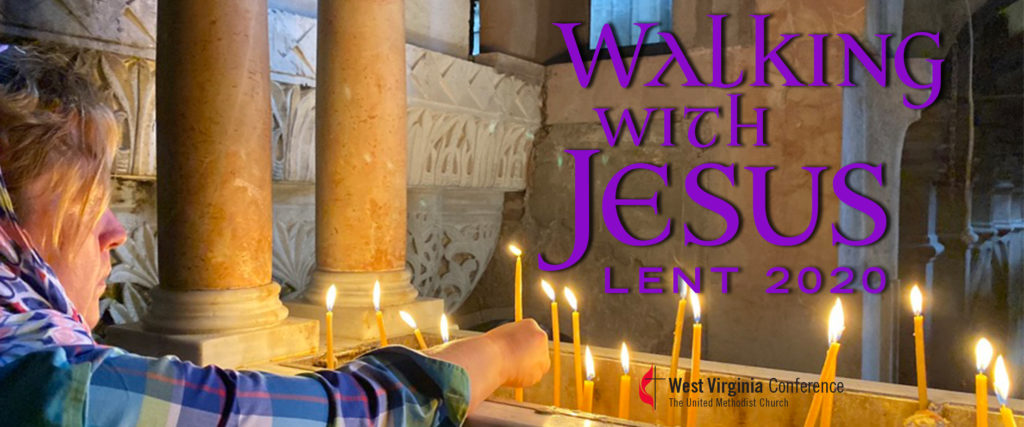
Lent begins with Jesus going into the wilderness for 40 Days and 40 nights. The picture to the left was taken near the Dead Sea, close to where Jesus was baptized.
The readings for the first Sunday of Lent are: Genesis 2:15–17; 3:1–7; Psalm 32 (UMH 766); Romans 5:12–19; Matthew 4:1–11
Rev. Jeff Taylor
United Methodist Foundation of West Virginia
Midland South District
Matthew 4:1-11 tells about the Temptation of Jesus in the wilderness. After Jesus was baptized by John, says Matthew, the Spirit led Jesus up into the wilderness so that the devil might tempt him. There Jesus fasted for 40 days and nights. Try to imagine how hungry you would be after a 40 day fast, how lonely and tired you would be after spending that time alone in the wilderness.
I was fortunate to have traveled with Bishop Steiner Ball and others from the West Virginia Conference to Israel for the Walking with Jesus experience. In the pre-dawn of the last Saturday in September, Mary and I met others at a parking lot in Hurricane, where we traveled by bus to Washington-Dulles Airport via Charleston, Mineral Wells, and Fairmont. From Washington we flew to Paris, France and then on to Tel-Aviv, where we met our tour guide and bus driver, who took us through Jerusalem to our first hotel in Bethlehem. After dinner and a few hours of sleep, our first full day of touring the Holy Land began Monday morning.
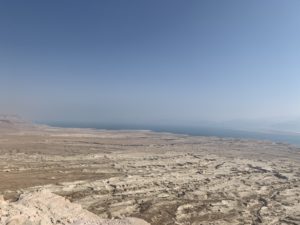
Vast wilderness around Jericho and the Dead Sea
As we traveled from Bethlehem toward the Dead Sea and Jericho, we got a sense of the wilderness. You can see from the pictures the vast area of desert. The landscape is little more than rocks, sand, and crumbled limestone with very little vegetation with the Dead Sea in the background. We came to a place called the Mount of Temptation, which claims to be the very wilderness described by Matthew. Of course, no one knows for sure if this is the place where Jesus was tempted.
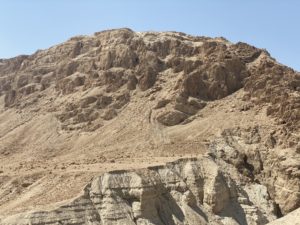
Mount of Temptation, Jericho
However, it is easy to imagine that it was a place similar to this, and certainly in the general area near the ancient city of Jericho and the Jordon River where Jesus was baptized. Whether it is the exact site is immaterial to the pilgrims who make their way there from all over the world, even from West Virginia, to walk where Jesus walked, and to reflect on who Jesus is and what it means for us.
At the foot of the Mount of Temptation, not too far from the Zacchaeus Tree, is the Temptation Restaurant (and gift shop). 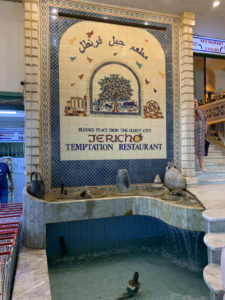 There we saw and experienced the truth of scripture quoted by Jesus that people do not live by bread alone. No, there we feasted on hummus, pita, falafel, all kinds of olives, fresh salads and marinated vegetables, and fish. All we could eat for ten American dollars, plus two dollars for a bottle of water. After my second plate, I was tempted to get dessert, but I figured if Jesus could withstand temptation in the desert, I could at least withstand the temptation of the dessert. Besides, I was full.
There we saw and experienced the truth of scripture quoted by Jesus that people do not live by bread alone. No, there we feasted on hummus, pita, falafel, all kinds of olives, fresh salads and marinated vegetables, and fish. All we could eat for ten American dollars, plus two dollars for a bottle of water. After my second plate, I was tempted to get dessert, but I figured if Jesus could withstand temptation in the desert, I could at least withstand the temptation of the dessert. Besides, I was full.
Jesus’ time in this place was very different than mine. Where I celebrated with close friends for an hour and a half with an all-you-can eat buffet and gift shop, Jesus spent time alone and fasted for 40 days and nights. It may be hard for us to relate to Jesus’ temptation. For one thing, I do not have supernatural powers. No matter how hard I tried, I would not be able to turn stones into bread, so I can’t really call that a win.
It is hard to relate if I focus too much on the details. Was this an internal struggle, or did Satan appear in person? Is he red? Does he have horns? But I think the point we are to take from the story is that Jesus, faced with the temptation for untold wealth and power, chose to follow God’s call to mission and ministry. He returns from his time in the wilderness strengthened with clarity of purpose and begins his ministry.
The same choice confronts each of us as lay and clergy people in the West Virginia Conference. We will almost assuredly find ourselves at some time in a wilderness where we feel alone, abandoned, afraid, and in pain. It could be a hospital room or a courtroom, a sanctuary or church meeting room. There will be times when we are tempted to give up, to give in, to compromise, or to choose the easier way. In those times, will we listen to God’s Spirit and allow God to work in us? Will we hear and listen to God's Spirit at work in us and obey God’s call to love and action?
Rev. Cindy Briggs-Biondi
St. Paul-Brown
Midland South District
When I prepared to travel to the Holy Land for the first time, I had in my mind all of the religious sites. I tried to imagine what it would be like to walk the streets of Jerusalem, to sit by the Sea of Galilee, to take in the views from the Mount of Beatitudes. I did end up doing all of those things, and they helped open up the Gospels to me in a new way. What I was not prepared for, however, was to see the harsh realities of poverty and oppression. While of course I knew about the Israeli-Palestinian conflict, I was not expecting to see something that felt so unholy in what I’ve always imagined to be the holiest of places.
I’ve been to the Holy Land twice now. Upon arriving the first time, we were met by a friend who was living in Bethlehem. As she took us through the checkpoint between Jerusalem and Bethlehem, we stopped at the separation wall. We got out of her car to look around and we could see tear gas cannisters littering the sidewalks that had been used against demonstrators earlier in the day. 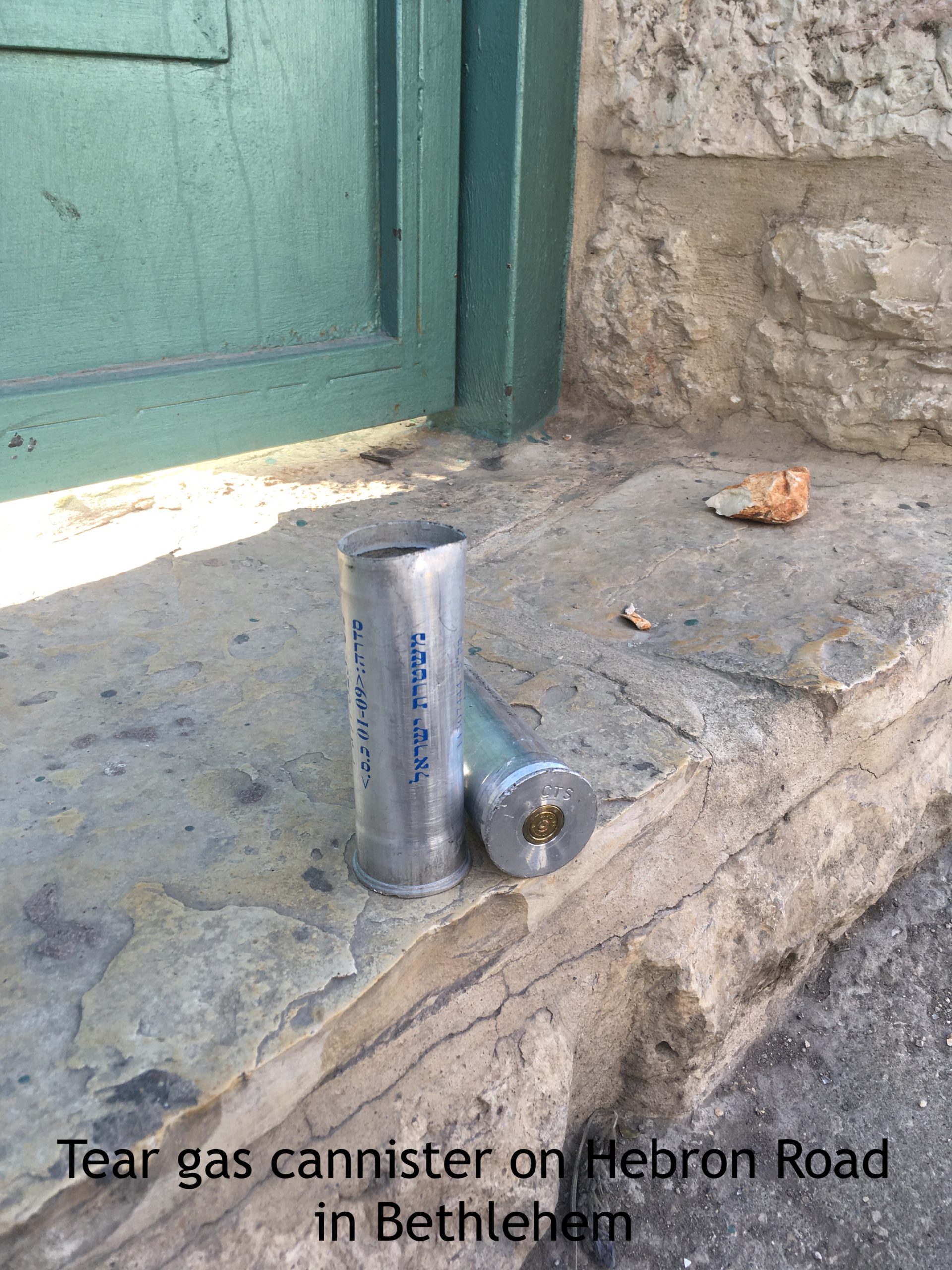
Later we would travel down to the Tent of Nations farm, which is owned by a Palestinian Christian family, and then on to Hebron, a West Bank city that bears deep and perpetually fresh wounds from the ongoing conflict. We would hear stories from Palestinian people who were struggling – struggling to keep their land, to make a living, and to live free from systematic oppression and violence. We would hear directly from people who were experiencing suffering and injustice.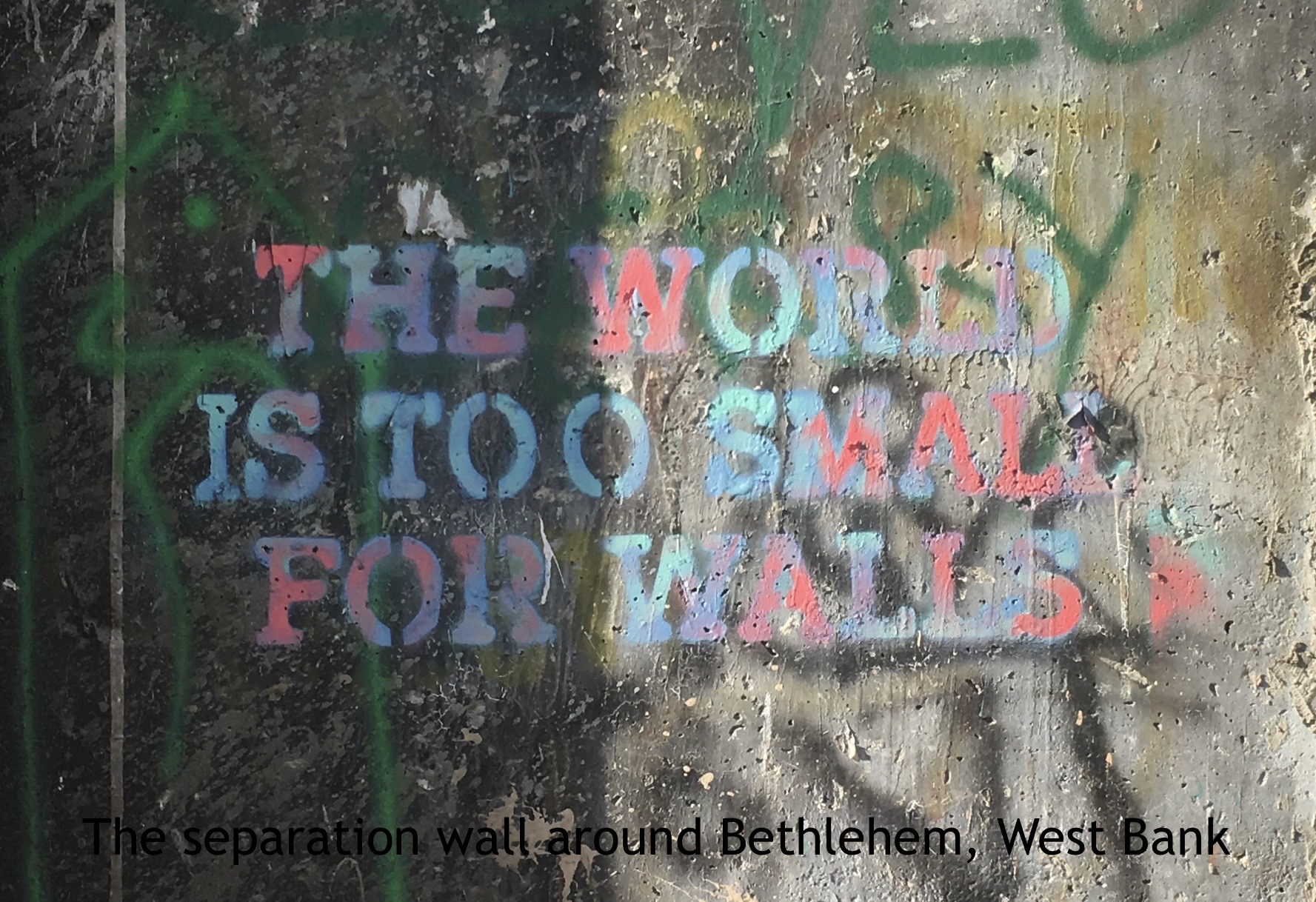
There is much beauty in the Holy Land, to be sure. But there is also much sin and suffering. As we read this week’s text from Romans, we are reminded of the stark reality of sin. Sin means death in so many ways. It leads to the death of relationships. It leads to the death of community. It leads to the death of the land. It leads to death by poverty and violence. These are all things that I witnessed and heard of first-hand in the Holy Land.
As we traveled around in the Israel and the West Bank, I was keenly aware of the fact that sin is, indeed, a human condition, from which none of us are exempt. Even a place, that in my mind was somehow more holy, experiences the absolute devastation of sin and death. And this is the world that Jesus entered into. The world 2000 years ago is not so very different from the world we live in today. Jesus entered into a time and a place of violence and oppression. He entered into a time and a place of sin and death.
We are entering into the season of Lent. It is a time of introspection. It is a time of confessing our sin. We are in just as much need of Jesus today as we were 2 millennia ago. May we move through this Lenten season with our eyes wide open – to the sin within our world and to the sin within our hearts. May our hearts also be wide open – to receive the free gift of grace, that through Jesus Christ, we may be seekers of justice and righteousness.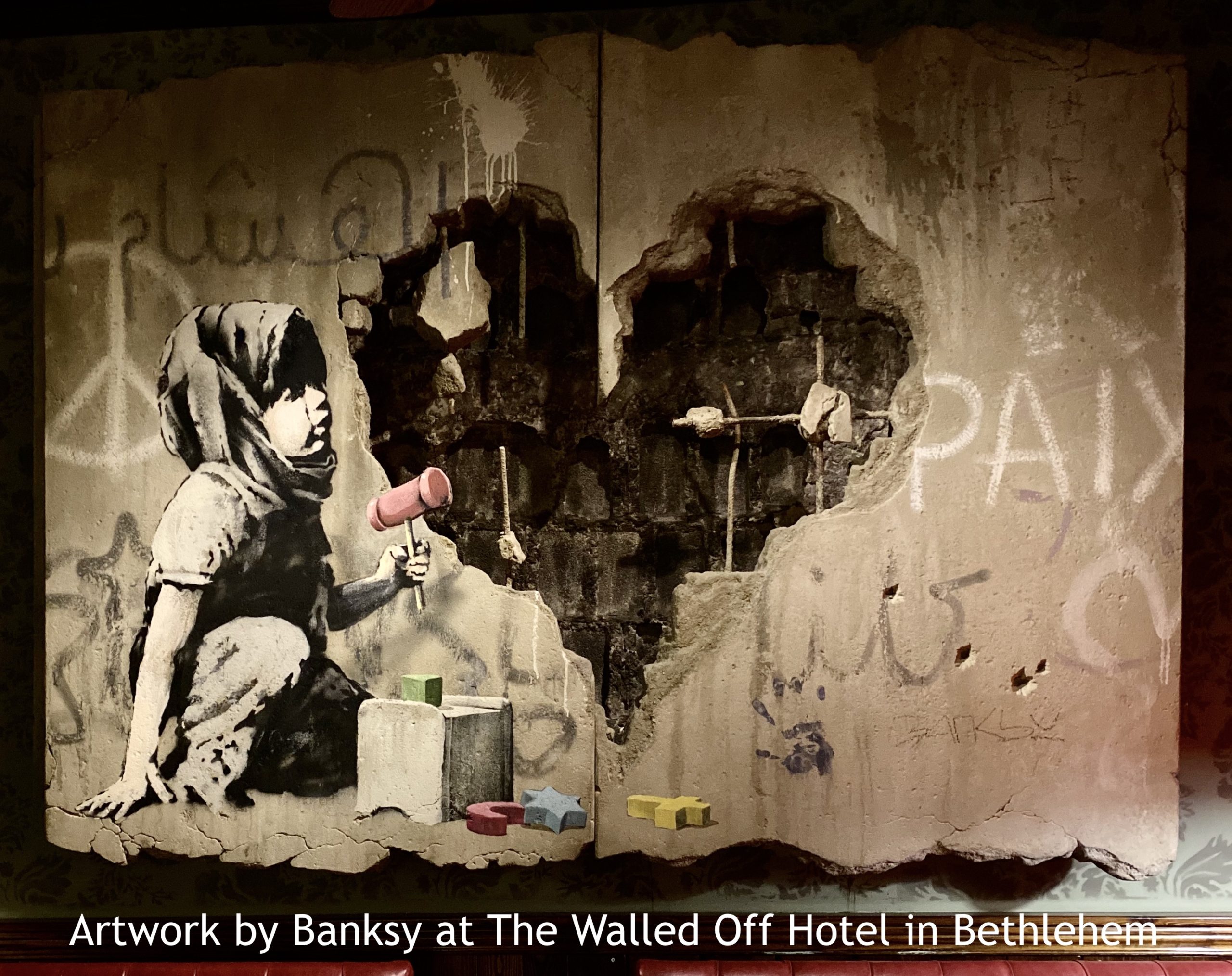
As you look within and around yourself, what do you see? What confession do you need to make today? Offer your confession to God, knowing that God receives it, and by the power of the Holy Spirit, has the ability to transform your heart. Thanks be to God.